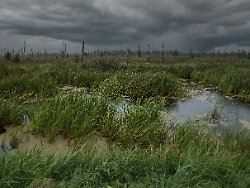Friday, August 6th, 2021
CO2 storage tanks often dry up
Peatland protection strategy fails due to disagreement
The strategy for the protection of the moors is actually in the coalition agreement, but the environment and agriculture ministries cannot agree – the ministers Schulze and Klöckner assign the blame to each other. The latter in particular is now massively criticized for its failure.
The federal government failed with its plan to present a strategy for better protection of the moors in Germany before the federal elections. Despite intensive efforts, it was not possible to reach an agreement with the Federal Ministry of Agriculture, said the environmental department. The Ministry of Agriculture rejected the criticism. Environmental groups sharply criticized the federal government for the failure of the peatland protection strategy.
The Federal Environment Ministry announced that it was now planning “to develop its own departmental strategy at short notice”. The draft of the peatland protection strategy was drawn up by the environmental department in accordance with an agreement in the coalition agreement. According to the ministry, it was “discussed with all the departments concerned and revised according to the suggestions.” Because of the resistance of the Ministry of Agriculture, headed by Julia Klöckner, the project “unfortunately has to be viewed as a failure”. This is all the more regrettable because the importance of peatland protection for climate protection is now widely recognized, explained the department of Environment Minister Svenja Schulze. “Better bog protection is a key element in protecting the climate and preserving biodiversity.”
The Ministry of Agriculture rejected the criticism and, in turn, accused the environmental department of a blockade. The demand of the agricultural department to orient the peatland strategy primarily to natural peatlands and not to those in agricultural use was therefore controversial. It was pointed out that there are other programs such as the peat reduction strategy for these. “Only a peatland protection strategy that is supported by those affected on site can be a successful strategy,” said the Ministry of Agriculture, referring to the interests of affected farmers as well as local authorities and associations that should be included in a strategy for agricultural peatlands. “Protecting peat soils more and preserving them in the long term is an important concern of our Federal Ministry,” assured the agricultural department.
Greens present immediate climate program in the moor
Renate Künast, a member of the Green Parliament, sharply criticized Klöckner. She accused the Minister of Agriculture of a “renewed climate foul”. “Once again, she apparently thinks that she is representing the interests of agriculture with her blockade, but the opposite is the case,” said Künast. “Moors are the largest carbon store in Germany, which is why we urgently need effective measures,” emphasized the Green politician. An end to the use of peat is necessary. The moors would have to be rewetted quickly and comprehensively with a large-scale renaturation program. The Greens chairmen Annalena Baerbock and Robert Habeck presented their party’s emergency climate program on Tuesday in a Brandenburg moorland to underline the importance of the moors.
The Environment Association Deutscher Naturschutzring (DNR) spoke of an “irresponsible concession to the agricultural lobby”. Klöckner operates “clientele policy at the expense of nature and the environment,” said DNR managing director Florian Schöne. Moor protection is one of the most important climate protection measures in the field of land use policy. Drained bogs alone are responsible for seven percent of German greenhouse gas emissions and are therefore on a par with annual air traffic in Germany.
Peatlands are considered to be important carbon stores. The federal government had therefore actually announced that it would massively promote their protection and rewetting.
.
